| Listing 1 - 10 of 55 | << page >> |
Sort by
|
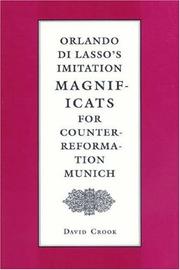
ISBN: 0691601178 1400863783 0691036144 1306984750 0691630933 9781400863785 9780691036144 9780691601175 Year: 1994 Publisher: Princeton, New Jersey : Princeton University Press,
Abstract | Keywords | Export | Availability | Bookmark
 Loading...
Loading...Choose an application
- Reference Manager
- EndNote
- RefWorks (Direct export to RefWorks)
After the Mass Ordinary, the Magnificat was the liturgical text most frequently set by Renaissance composers, and Orlando di Lasso's 101 polyphonic settings form the largest and most varied repertory of Magnificats in the history of European music. In the first detailed investigation of this repertory, David Crook focuses on the forty parody or imitation Magnificats, which Lasso based on motets, madrigals, and chansons written by such composers as Josquin and Rore. By examining these Magnificats in their social, historical, and liturgical contexts and in terms of composition theory, Crook opens a new window on the breadth and subtlety of an important composer often harshly judged on his use of preexistent music.Crook places Lasso amidst the Counter-Reformation reforms at the Bavarian court where he composed the Magnificats, and where there emerged a fanatical Marian cult that favored this genre. In a section on compositional procedure, Crook explains that Lasso abandoned the traditional eight psalm-tone melodies in his imitation Magnificats, considers the new ways he found to represent the tones, and describes how Lasso's experimentation reflected the complex relationship between mode and tone in Renaissance theory and practice. Arguing that Lasso's varied uses of preexistent music defy current definitions of parody technique, Crook, in his final chapter, reveals the imitation Magnificats as vastly more imaginative and innovative than previous characterizations suggest.Originally published in 1994.The Princeton Legacy Library uses the latest print-on-demand technology to again make available previously out-of-print books from the distinguished backlist of Princeton University Press. These editions preserve the original texts of these important books while presenting them in durable paperback and hardcover editions. The goal of the Princeton Legacy Library is to vastly increase access to the rich scholarly heritage found in the thousands of books published by Princeton University Press since its founding in 1905.
Magnificat (Music) --- Church music --- History and criticism --- History and criticism. --- Lasso, Orlando di, --- -Church music --- Pastoral music (Sacred) --- Religious music --- Sacred vocal music --- Devotional exercises --- Liturgics --- Music --- Music in churches --- Psalmody --- Evening service music --- Religious aspects --- Christianity --- Lasso, Orlando di --- Munich (Germany) --- 16th century --- 526.30 --- Genre- en werkbesprekingen
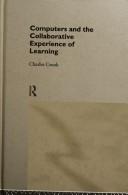
ISBN: 0415053595 Year: 1994 Publisher: London Routledge
Abstract | Keywords | Export | Availability | Bookmark
 Loading...
Loading...Choose an application
- Reference Manager
- EndNote
- RefWorks (Direct export to RefWorks)
Computer-assisted instruction --- Group work in education --- Enseignement assisté par ordinateur --- Enseignement --- Psychological aspects --- Aspect psychologique --- Travail en équipe --- Group work in education. --- Pedagogiek en onderwijskunde --- Psychological aspects. --- onderwijstechnologie --- onderwijstechnologie. --- Onderwijstechnologie. --- Enseignement assisté par ordinateur --- Travail en équipe
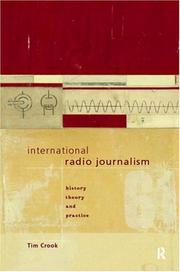
ISBN: 0415096731 0415096723 9780415096737 1134863004 1280321857 0203423232 9780203423233 9780415096720 9786610321858 661032185X 9781134863006 9781280321856 1134862997 Year: 1998 Volume: *14 Publisher: New York : Routledge,
Abstract | Keywords | Export | Availability | Bookmark
 Loading...
Loading...Choose an application
- Reference Manager
- EndNote
- RefWorks (Direct export to RefWorks)
The author explores how radio journalists have documented the major events of the twentieth century.
Radio journalism. --- Journal parlé --- Nieuwsberichten (Radio) --- Radio journalism --- Radio news --- Radionieuws --- Journalism --- Mass communications --- #SBIB:309H1523 --- #SBIB:AANKOOP --- #SBIB:309H301 --- radiojournalistiek --- geschiedenis --- journalistiek --- radio --- 092 --- 094 --- Radio- en/of televisieprogramma's met een informatieve functie --- De communicator in de verschillende media (pers, omroep, film, boekenindustrie, ...) --- journalistiek, pers --- Radio broadcasting of news --- Broadcast journalism --- Radio broadcasting --- Broadcast journalism. --- Broadcast news --- News broadcasting --- Broadcasting --- Press --- Journalistes de radio --- Radio --- Emissions de nouvelles
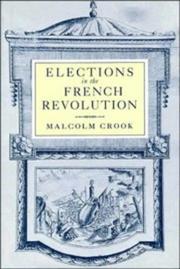
ISBN: 0521451914 0585129738 9780585129730 9780511581809 0511581807 9780521451918 9780521890977 0511000634 0521890977 Year: 1996 Publisher: Cambridge : Cambridge University Press,
Abstract | Keywords | Export | Availability | Bookmark
 Loading...
Loading...Choose an application
- Reference Manager
- EndNote
- RefWorks (Direct export to RefWorks)
This book explores the vital but neglected issue of elections in the French Revolution. Based on extensive research in different regions of France, it is the only general survey to examine the full range of local and national contests, from the Estates General to the advent of Napoleon. Focusing on electoral behaviour, it reveals a fascinating experiment with a quasi-universal suffrage, which established enduring features of French elections. The retention of the traditional practice of voting in assemblies, and a refusal to acknowledge candidates, canvassing and competing political parties, inhibited the emergence of a pluralistic electoral culture. Nonetheless, frequent polling offered unprecedented political opportunities to millions. This revolutionary apprenticeship in democracy left a lasting imprint on the development of modern French citizenship.
Elections --- -Electoral politics --- Franchise --- Polls --- Political science --- Politics, Practical --- Plebiscite --- Political campaigns --- Representative government and representation --- History --- -France --- Politics and government --- -Elections --- Pʻŭrangsŭ --- Frankrig --- Francja --- Frant︠s︡ii︠a︡ --- Prantsusmaa --- Francia (Republic) --- Tsarfat --- Tsorfat --- Franḳraykh --- Frankreich --- Fa-kuo --- Faguo --- Франция --- French Republic --- République française --- Peurancih --- Frankryk --- Franse Republiek --- Francland --- Frencisc Cynewīse --- فرنسا --- Faransā --- Franza --- Republica Franzesa --- Gallia (Republic) --- Hyãsia --- Phransiya --- Fransa --- Fransa Respublikası --- Franse --- Францыя --- Frantsyi︠a︡ --- Французская Рэспубліка --- Frantsuzskai︠a︡ Rėspublika --- Parancis --- Pransya --- Franis --- Francuska --- Republika Francuska --- Bro-C'hall --- Френска република --- Frenska republika --- França --- República Francesa --- Pransiya --- Republikang Pranses --- Γαλλία --- Gallia --- Γαλλική Δημοκρατία --- Gallikē Dēmokratia --- فرانسه --- Farānsah --- צרפת --- רפובליקה הצרפתית --- Republiḳah ha-Tsarfatit --- פראנקרייך --- 法国 --- 法蘭西共和國 --- Falanxi Gongheguo --- フランス --- Furansu --- フランス共和国 --- Furansu Kyōwakoku --- Francija --- Ranska --- Frankrike --- France --- 18th century --- 1789-1799 --- Elections - France - History - 18th century. --- France - Politics and government - 1789-1799. --- Electoral politics --- Arts and Humanities

ISBN: 0203190742 113460694X 1280400609 0203006275 9780203190746 0415216028 9780415216029 0415216036 9780415216036 9780203006276 9786610400607 6610400601 9781280400605 9781134606894 9781134606931 9781134606948 1134606931 Year: 1999 Publisher: London ; New York : Routledge,
Abstract | Keywords | Export | Availability | Bookmark
 Loading...
Loading...Choose an application
- Reference Manager
- EndNote
- RefWorks (Direct export to RefWorks)
Radio Drama brings together the practical skills needed for radio drama, such as directing, writing and sound design, with media history and communication theory.
Book
ISBN: 0520964543 9780520964549 9780520290341 0520290348 9780520290358 0520290356 Year: 2016 Publisher: Oakland: University of California press,
Abstract | Keywords | Export | Availability | Bookmark
 Loading...
Loading...Choose an application
- Reference Manager
- EndNote
- RefWorks (Direct export to RefWorks)
"When and how did public health become modern? In Governing Systems, Tom Crook re-examines this key question in the context of Victorian and Edwardian England, long regarded as one of the 'homes' of modern public health. The modernity of modern public health, Crook argues, should be located not in the rise of a centralized, bureaucratic and disciplinary State, but in the contested formation and intricate functioning of systems of governing, from the administrative to the technological. Equally, we need to embrace a dialectical understanding of modern governance, one that is rooted in the interaction of multiple levels, agents and times. Theoretically ambitious, but empirically grounded, Governing Systems will be of interest to historians of modern public health and modern Britain, as well as anyone interested in the complex gestation of the governmental dimensions of modernity"--Provided by publisher.
Medical policy --- Public health --- HISTORY / Europe / Great Britain / General. --- Health care policy --- Health policy --- Medical care --- Medicine and state --- Policy, Medical --- Public health policy --- State and medicine --- Science and state --- Social policy --- Community health --- Health services --- Hygiene, Public --- Hygiene, Social --- Public health services --- Public hygiene --- Social hygiene --- Health --- Human services --- Biosecurity --- Health literacy --- Medicine, Preventive --- National health services --- Sanitation --- History --- 19th century --- England. --- 20th century --- Government policy --- Public health - England - History - 19th century --- Public health - England - History - 20th century --- Medical policy - England - History - 19th century --- Medical policy - England - History - 20th century --- 1800s. --- 1900s. --- 19th century. --- 20th century. --- agency. --- british history. --- bureaucracy. --- criticism. --- death rate. --- disease. --- early 20th century. --- edwardian england. --- european history. --- government. --- health and safety. --- health and wellness. --- humanity. --- medical. --- medicine. --- modern society. --- modern world. --- modernity. --- philosophy. --- political. --- politics. --- public health. --- public safety. --- social studies. --- systems of government. --- theoretical. --- victorian england. --- world history.
Book
ISBN: 0809333880 9780809333882 9780809333875 0809333872 Year: 2015 Publisher: Carbondale : Southern Illinois University Press,
Abstract | Keywords | Export | Availability | Bookmark
 Loading...
Loading...Choose an application
- Reference Manager
- EndNote
- RefWorks (Direct export to RefWorks)
Throughout Salt Moon, Noel Crook forges the kind of tragic vision Howard Nemerov described as the mark of our finest poets: drawing on myth and memory, Crook's fierce lyrics reveal a world that is at once "hopeless and beautiful . . . giving equal emphasis to both words." Sacrifice and betrayal, parental love and patricide, unleased desire and cornered despair-these antitheses fuel Crook's Ovidian imagination, which ranges freely from Comanche raids in Texas to a slave plantation in North Carolina, from a carpet maker in Istanbul to beggars in Delhi, from her daughter's hospital room to the wa
Book
ISBN: 168448166X 9781684481668 9781684481637 1684481635 9781684481620 1684481627 Year: 2020 Publisher: Lewisburg, Pennsylvania : Bucknell University Press,
Abstract | Keywords | Export | Availability | Bookmark
 Loading...
Loading...Choose an application
- Reference Manager
- EndNote
- RefWorks (Direct export to RefWorks)
The Imprisoned Traveler is a fascinating portrait of a unique book, its context, and its elusive author. Joseph Forsyth, traveling through an Italy plundered by Napoleon, was unjustly imprisoned in 1803 by the French as an enemy alien. Out of his arduous eleven-year “detention” came his only book, Remarks on Antiquities, Arts, and Letters during an Excursion in Italy (1813). Written as an (unsuccessful) appeal for release, praised by Forsyth’s contemporaries for its originality and fine taste, it is now recognized as a classic of Romantic period travel writing. Keith Crook, in this authoritative study, evokes the peculiar miseries that Forsyth endured in French prisons, reveals the significance of Forsyth’s encounters with scientists, poets, scholars, and ordinary Italians, and analyzes his judgments on Italian artworks. He uncovers how Forsyth’s allusiveness functions as a method of covert protest against Napoleon and reproduces the hitherto unpublished correspondence between the imprisoned Forsyth and his brother. Published by Bucknell University Press. Distributed worldwide by Rutgers University Press.
Forsyth, Joseph, --- Travel --- Italy.
Book
ISBN: 9781684481668 Year: 2019 Publisher: Lewisburg, PA
Abstract | Keywords | Export | Availability | Bookmark
 Loading...
Loading...Choose an application
- Reference Manager
- EndNote
- RefWorks (Direct export to RefWorks)
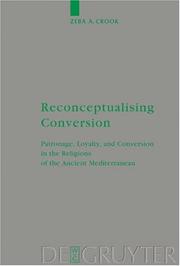
ISBN: 3110182653 311091560X 9783110915600 9783110182651 Year: 2004 Volume: 130 Publisher: Berlin ; New York : W. de Gruyter,
Abstract | Keywords | Export | Availability | Bookmark
 Loading...
Loading...Choose an application
- Reference Manager
- EndNote
- RefWorks (Direct export to RefWorks)
Die Studie nimmt die bisherige Diskussion der Konversion in der Antike neu auf durch eine Verknüpfung von klassischen, epigraphischen und biblischen Quellen mit einer sozialwissenschaftlichen Methodologie. Der Autor hinterfragt dabei die bisher vorausgesetzte psychologische Kontinuität zwischen antiken und modernen Menschen und bietet statt dessen ein Modell, welches an den Denkvoraussetzungen der Antike selbst gebildet wurde. Die griechisch-römischen und mediterranen Religionen und Philosophien - also auch das hellenistische Judentum und das Christentum - orientierten sich an den Modellen von Patronat und Loyalität. Das Verständnis der antiken Konversion muss also hier ansetzen. In diesem Zusammenhang wird auch die "Bekehrung" des Paulus neu gedeutet. This monograph challenges the dominant psychological assumptions that attend modern treatments of ancient conversion and offers in its place a model based on categories the ancients themselves used: patronage and loyalty.
Psychologie en godsdienst --- Psychologie et religion --- Psychology and religion --- Religion and psychology --- Conversion --- Patron and client --- God --- Worship and love --- Paul, --- 292 --- Godsdiensten van Grieken en Romeinen. Klassieke mythologie --- Paul --- Psychology --- Christianity --- Rome --- Greece --- worship and love --- History of doctrines --- Clientela --- Clientelism --- Patronage, Roman --- Religious conversion --- Pavel, --- Pavol, --- Paulus von Tarsus, --- Paulos, --- Pōghos, --- Paweł, --- Paweł z Tarsu, --- Būlus, --- Pablo, --- Paulo de Tarso, --- Paolo di Tarso, --- Pál, --- Apostolos Paulos --- Saul, --- القديس بولس الرسول --- بولس، --- 사도바울 --- Conversion. --- Religion --- Love --- Worship --- Psychology, Religious --- Proselytizing --- Paulus, --- Pawełm --- Paulo, --- Paolo, --- Psychology and religion. --- Christianity. --- Worship and love. --- Patron and client - Rome --- Patron and client - Greece --- God - Worship and love --- Paul, - the Apostle, Saint - Conversion --- Paul, - the Apostle, Saint
| Listing 1 - 10 of 55 | << page >> |
Sort by
|

 Search
Search Feedback
Feedback About UniCat
About UniCat  Help
Help News
News